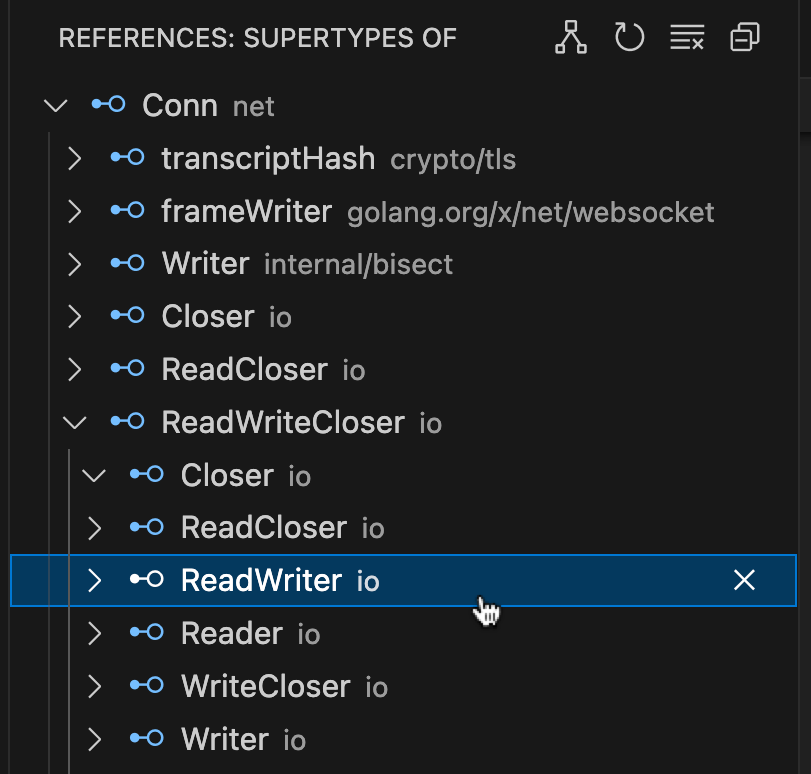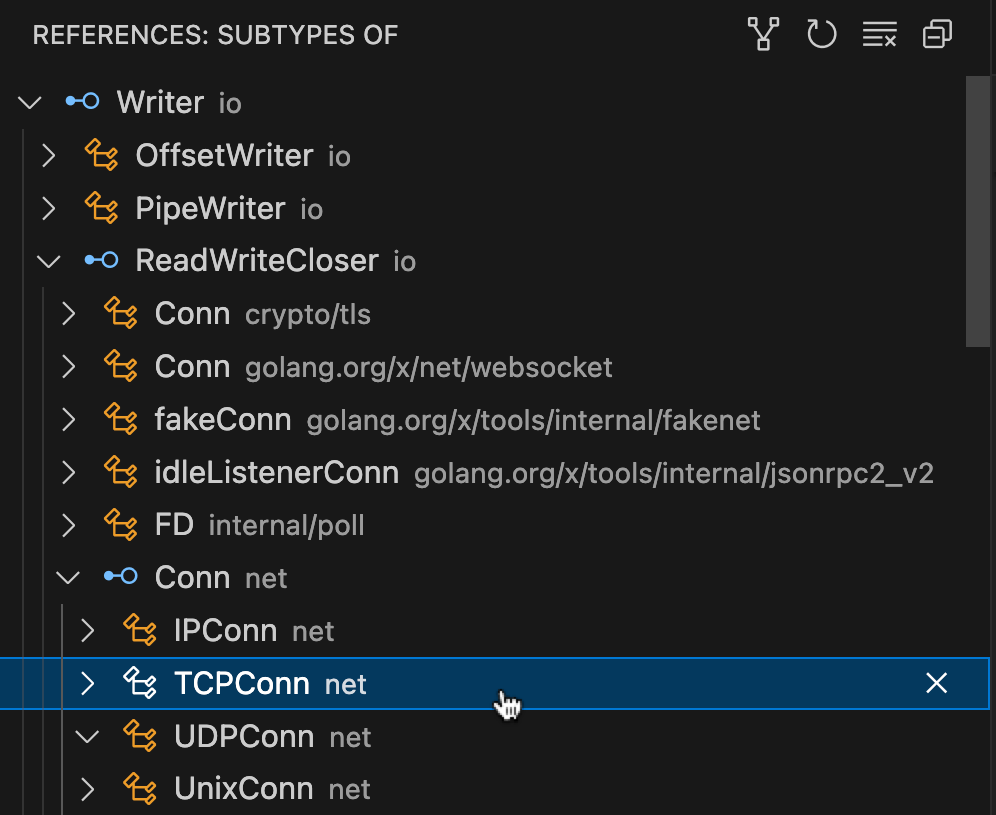Complete list of issues closed: gopls/v0.19.0 milestone
Configuration Changes
- The
gopls checksubcommand now accepts a-severityflag to set a minimum severity for the diagnostics it reports. By default, the minimum severity is "warning", sogopls checkmay report fewer diagnostics than before. Set-severity=hintto reproduce the previous behavior.
Navigation features
"Implementations" supports signature types (within same package)
The Implementations query reports the correspondence between abstract and concrete types and their methods based on their method sets. Now, it also reports the correspondence between function types, dynamic function calls, and function definitions, based on their signatures.
To use it, invoke an Implementations query on the func token of the definition of a named function, named method, or function literal. Gopls reports the set of function signature types that abstract this function, and the set of dynamic calls through values of such types.
Conversely, an Implementations query on the func token of a signature type, or on the ( paren of a dynamic function call, reports the set of concrete functions that the signature abstracts or that the call dispatches to.
Since a type may be both a function type and a named type with methods (for example, http.HandlerFunc), it may participate in both kinds of Implements queries (method-sets and function signatures). Queries using method-sets should be invoked on the type or method name, and queries using signatures should be invoked on a func or ( token.
Only the local (same-package) algorithm is currently supported. (https://go.dev/issue/56572 tracks the global algorithm.)
"Go to Implementation" reports interface-to-interface relations
The "Go to Implementation" operation now reports relationships between interfaces. Gopls now uses the concreteness of the query type to determine whether a query is "downwards" (from an interface to the types that implement it) or "upwards" (from a concrete type to the interfaces to which it may be assigned). So, for example:
-
implementation(io.Reader)subinterfaces such asio.ReadCloser, and concrete implementations such as*os.File. -
implementation(os.File)includes only interfaces, such asio.Readerandio.ReadCloser.
To request an "upwards" query starting from an interface, for example to find the superinterfaces of io.ReadCloser, use the Type Hierarchy feature described below. (See microsoft/language-server-protocol#2037.)
Support for Type Hierarchy
Gopls now implements the three LSP methods related to the Type Hierarchy viewer: textDocument/prepareTypeHierarchy, typeHierarchy/supertypes, typeHierarchy/subtypes.
In VS Code, select "Show Type Hierarchy" from the context menu to see a tree widget displaying all the supertypes or subtypes of the selected named type.
Editing features
Completion: auto-complete package clause for new Go files
Gopls now automatically adds the appropriate package clause to newly created Go files, so that you can immediately get started writing the interesting part.
It requires client support for workspace/didCreateFiles
New GOMODCACHE index for faster Organize Imports and unimported completions
By default, gopls now builds and maintains a persistent index of packages in the module cache (GOMODCACHE). The operations of Organize Imports and completion of symbols from unimported pacakges are an order of magnitude faster.
To revert to the old behavior, set the importsSource option (whose new default is "gopls") to "goimports". Users who don't want the module cache used at all for imports or completions can change the option to "off".
Analysis features
Most staticcheck analyzers are enabled by default
Slightly more than half of the analyzers in the Staticcheck suite are now enabled by default. This subset has been chosen for precision and efficiency.
Previously, Staticcheck analyzers (all of them) would be run only if the experimental staticcheck boolean option was set to true. This value continues to enable the complete set, and a value of false continues to disable the complete set. Leaving the option unspecified enables the preferred subset of analyzers.
Staticcheck analyzers, like all other analyzers, can be explicitly enabled or disabled using the analyzers configuration setting; this setting now takes precedence over the staticcheck setting, so, regardless of what value of staticcheck you use (true/false/unset), you can make adjustments to your preferred set of analyzers.
recursiveiter: "inefficient recursive iterator"
A common pitfall when writing a function that returns an iterator (iter.Seq) for a recursive data type is to recursively call the function from its own implementation, leading to a stack of nested coroutines, which is inefficient.
The new recursiveiter analyzer detects such mistakes; see its documentation for details, including tips on how to define simple and efficient recursive iterators.
maprange: "inefficient range over maps.Keys/Values"
The new maprange analyzer detects redundant calls to maps.Keys or maps.Values as the operand of a range loop; maps can of course be ranged over directly. See its documentation for details).
Code transformation features
Rename method receivers
The Rename operation, when applied to the declaration of a method receiver, now also attempts to rename the receivers of all other methods associated with the same named type. Each other receiver that cannot be fully renamed is quietly skipped.
Renaming a use of a method receiver continues to affect only that variable.
type Counter struct { x int }
Rename here to affect only this method
↓
func (c *Counter) Inc() { c.x++ }
func (c *Counter) Dec() { c.x++ }
↑
Rename here to affect all methods"Eliminate dot import" code action
This code action, available on a dotted import, will offer to replace the import with a regular one and qualify each use of the package with its name.
Add/remove tags from struct fields
Gopls now provides two new code actions, available on an entire struct or some of its fields, that allow you to add and remove struct tags. It adds only 'json' tags with a snakecase naming format, or clears all tags within the selection.
Add tags example:
type Info struct {
LinkTarget string -> LinkTarget string `json:"link_target"`
...
}Inline local variable
The new refactor.inline.variable code action replaces a reference to a local variable by that variable's initializer expression. For example, when applied to s in println(s):
func f(x int) {
s := fmt.Sprintf("+%d", x)
println(s)
}it transforms the code to:
func f(x int) {
s := fmt.Sprintf("+%d", x)
println(fmt.Sprintf("+%d", x))
}Only a single reference is replaced; issue https://go.dev/issue/70085 tracks the feature to "inline all" uses of the variable and eliminate it.
Thank you to our contributors!
@acehinnnqru @adonovan @albfan @aarzilli @ashurbekovz @cuonglm lm @dmitshur @neild @egonelbre @shashank-priyadarshi @firelizzard18 @gopherbot @h9jiang @cuishuang @jakebailey @jba @madelinekalil @karamaru-alpha @danztran @nsrip-dd @pjweinb @findleyr @samthanawalla @seankhliao @tklauser @vikblom @kwjw @xieyuschen

